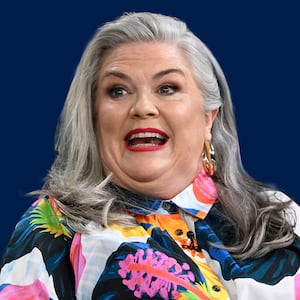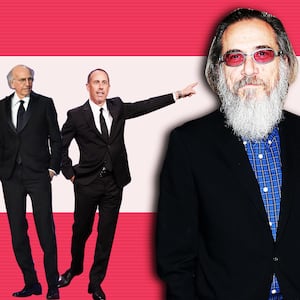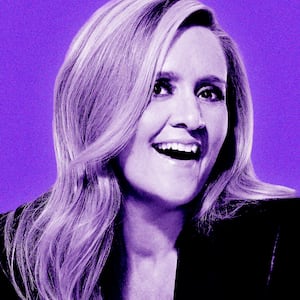If there’s anyone in Hollywood who might be immune to criticism, it’s 11-time Emmy winner and Mark Twain Prize for American Humor recipient Julia Louis-Dreyfus. But as the comedy legend admits in this episode of The Last Laugh podcast, the rare negative comment about her work still “stings.”
That feeling is at the heart of Louis-Dreyfus’ new film You Hurt My Feelings, in which she delivers the most emotionally raw performance of her career. During our conversation, the actress reflects on her early struggles as a cast member on Saturday Night Live and the catharsis of returning as host. She also reveals what she really thought about the divisive Seinfeld finale 25 years later, breaks down the difference between Veep’s Selina Meyer and her own “narcissistic” father, and a lot more.
You Hurt My Feelings is Louis-Dreyfus’ second film with Nicole Holofcener and comes nearly a decade after their previous collaboration, Enough Said. She was eager to reunite with the filmmaker partly because Holofcener’s writing allows Louis-Dreyfus to display a side of herself that she hasn’t always been able to on screen.
“As a writer, she so brilliantly straddles the very believable world of drama and comedy in real life and how they intertwine with one another,” the actress says. “And that is very appealing to me. I like that tone.”
In the film, which arrives in theaters on May 26, Louis-Dreyfus plays Beth, a mildly successful author who overhears her husband (Tobias Menzies) admitting that he thinks her new novel is genuinely bad. His comments, which were never meant for her ears, threaten to tear apart their otherwise blissful marriage of multiple decades.
Louis-Dreyfus says she has never personally had the experience of learning that her husband (former SNL castmate Brad Hall) or someone else close to her didn’t like her work. “But I could certainly imagine it,” she says. “And I can tell you that just even thinking about it makes my skin crawl.”
Below is an edited excerpt from our conversation. You can listen to the whole thing by subscribing to The Last Laugh on Apple Podcasts, Spotify, Google, Stitcher, Amazon Music, or wherever you get your podcasts, and be the first to hear new episodes when they are released every Tuesday.
How do you handle criticism now versus earlier in your career? Does it hit you very differently now than it did when you were starting out?
Hmm. I think so. I think I’m a little more confident now that I’m older. But it’s nicer to get a compliment than it is a criticism.
Well, it might also be true that you haven’t gotten much negative criticism in this later part of your career, just because your work has been so incredible, as have the projects that you’ve worked on. So that might be a factor, too, right? That it has maybe been a while since you’ve even heard negative criticism?
No, I’ve heard negative criticism. And there’s always a little sting, but maybe the sting doesn’t last as long.
I know you’ve talked about getting bad reviews for SNL when you were starting out, both in print and even from people in your own life. Was that a particularly difficult situation for you? Because you were so young—you were 21 when you started on that show.
Yes, and Tom Shales, for example, was the critic at the Washington Post. And he said some nasty stuff about me. And my parents lived in that town. So that did hurt my feelings. But he subsequently came around. He has said some nice things since then.
I know you didn’t necessarily succeed at Saturday Night Live the way you wanted to. Looking back, have you thought about what factors caused that? Because it’s clearly not a lack of comedic talent on your part. So was it not a great fit? Or was it the culture of the place?
Well, I think it was many, many things. I was very young and inexperienced, so I have to take some ownership here. I didn’t go into that gig with a big bag of characters and accents and stuff that I could sort of pull out. I had this somewhat foolish idea that people would write for me because I was in the cast, but it didn’t quite work like that. So I came into it very green. It was an incredibly misogynistic, drug-addled atmosphere. And it was really hard for me to navigate.
Is there anything that you feel like you would do differently if you could do it again, knowing what you know now?
Yeah, and I did when I went back to host. That was an amazing thing. It was an incredible experience, because I had decades and decades of experience that I could bring to it. Now of course, being a host and being a cast member are two different things. However, there is some overlap and I understood what I needed to do in order to make the hosting gig work. And I had a confidence that I absolutely didn’t have when I was 21. Other things had changed too. It was different producers running the show, and they’re running it very competently. It was certainly not a misogynistic—at least to my eye—atmosphere. A lot of very strong, powerful, funny women were there: Tina [Fey], Amy [Poehler], Kristen [Wiig], all of them were there when I was there the first time to host [in 2006]. So it was a very different culture. But the schedule and the actual practicality of doing this show, starting on a Monday to that Saturday, has not changed. And so I knew the protocols and I knew what my agenda had to be.
That must have been very strange to go back with a totally different power dynamic so many years later.
Yeah, it really was, it was something else. But, you know, I’ve got to tell you, when I went back the first time to host, I was the first former female cast member to ever be invited back to host. They hadn’t had anyone else.
Seinfeld, it seems like from the outside at least, was just such a better fit for you comedically than SNL was. Did you feel that? And what made it better for you?
Well, first of all, it was written exceptionally well. And there was nothing like it on television at the time.
I believe you auditioned for the show with this very quintessential scene about nothing, where it’s you and Jerry talking about going out to do something, but you’re not hungry, and you’ll go, but only if you don’t have to talk. When you read that scene in the audition, what did that tell you about what this show was going to be?
It told me everything about what the show is going to be. It was very much like Larry David’s voice. I knew Larry back from SNL days. I knew that this really weird, quirky writing was something that I understood in my bones. So it felt very natural to me. It felt like me.
Elaine is not in the pilot, but then you come in in that second episode. What was it like to enter that world as the only female character on this show? Was there a pressure to put that female perspective in the show? Because obviously that was the note that they got after making the pilot, that they needed another element in the show.
Well, I never really approached it from the perspective of my gender, per se. I wanted to just play ball with everybody. I’m not going to lie, in the beginning, I didn’t always have a lot to do in certain episodes. And I would go to Larry and Jerry multiple times and say, “Hey, you guys, write me more, I need to be in this show more.” That’s what I just kept doing. And they did.
It’s so funny because in the episode about the pilot that they’re making within the show, that’s basically what happens. They’re realizing that they don’t know how to write for a woman. So they were kind of self-aware about that, right?
But then, you see, they didn’t write for me as a woman. They just wrote for me, for this character, as opposed to this gender, which I think is instructive in a lot of ways from a writing point of view.
Larry David’s famous mantra about the show was, “No hugging, no learning.” But I did want to know if you feel like playing Elaine over nine seasons, did she evolve? Did she change? Or did she really stay the same for you?
I think she evolved. I think she got angrier. [Laughs]
Yeah? How did that manifest for you?
I mean, you have to wonder why these four characters would always hang out together. They’re constantly bickering, they’re constantly getting into trouble in one way or another, losing money.
I have to ask you about this: I interviewed [Seinfeld writer] Larry Charles years ago, and he was telling me the story about the episode he wrote about Elaine buying a gun. And that’s basically why he left the show, is that the network rejected the idea. Did you ever see that script?
Yeah, we did a table read of it.
What do you remember about it?
I remember it didn’t get a lot of laughs. And believe me, I love Larry Charles, don’t misunderstand, but that script felt a little dark. It was out of people’s comfort zones, and that’s saying something on that show.
Obviously, the finale was very divisive. And I love the moment that you had on David Letterman’s final show where you came out in the Top 10 list and said that line about “taking part in another hugely disappointing series finale” with Jerry standing right behind you. It feels like the finale of a show like Seinfeld is just a no-win situation, that you can’t please everybody. What did you actually think of it at the time? Were you happy with the way that this show ended?
Well, I will say that just from a purely emotional point of view, it was really a delight to sit there in that courtroom and watch one guest actor after another parade through. I mean, it’s like we were watching the show, so that was really fun, that aspect of it. But I understood why people were disappointed. First of all, expectations were ridiculous. But I also understood, because we didn’t do too much in it. Once we had been arrested and in court, it was just us sitting there watching one person after another parade through.
I assume Jerry knew that you were going to make that joke on Letterman? That wasn’t a genuinely surprised reaction from him?
Of course, yes. In fact, there was a different joke that the Letterman writers had written for me to say. And I was arguing with them about it because I didn’t think it was funny enough. And then they pulled out this list of alternative jokes and that one was on it. And both Jerry and I were like, “That one!”
Veep had some Seinfeld alums involved in it, but it’s so different from Seinfeld in a lot of ways. What were the biggest differences for you making Seinfeld and then making Veep?
Totally different experience. I mean, it was an ensemble for sure, but I did produce it. It was single camera, we shot on location. It was a completely different style, brand, of comedy. And I don’t mean to imply better or worse, just it was its own thing. Like Seinfeld was its own thing. And once again, it was a sheer delight to do, albeit incredibly challenging.
After the episode where Selina’s mother dies and you have that insane laugh moment, [showrunner] David Mandel told The Daily Beast that you were “the only human on Earth who could have played that.” What do you remember about that moment?
I remember that it came to me as we were shooting it. And I just put my foot on the gas. I just kept doing it, because it was so outrageous what was happening, and I got a huge kick out of that moment, I have to say.
I think that’s one of many moments that really exemplifies Selina’s profound narcissism. I was listening to your podcast and you talk about how your father was, as you say, a deep narcissist. And I was wondering if you ever made that connection while playing Selina on Veep?
Hmm. I hadn’t thought of it like that, because my dad—yes, he was a narcissist, but he was also a really charming one and incredibly intelligent.
Something Selina’s lacking?
Exactly. And he was very charismatic. So for me, in terms of playing Selina, I could understand her nastiness and her bitter frustration and her rabid ambition. D.C. is not a kind place to women, and frankly, the parallels between the political world and show business, they exist. So there was plenty to sort of tap into in that sense. In entertainment, if you’re an actor or celebrity or whatever, you’re selling yourself. Your brand is you. And so you’re trying to stay relevant. You want to keep working. I want to keep working. I don’t want to get “voted out next election.” And this is true of people in D.C. as well. They’re selling themselves. They’re trying to appeal to the masses. It’s very confusing, perhaps, you could say, to be a woman under those circumstances in both instances.
Do you feel like those feelings have made you more cautious about what you say? Do you worry about saying the wrong thing? Because a lot of politicians are like that. And then, of course, there are politicians like Trump who go the entirely opposite direction and seem to succeed that way. How do you think about that?
Well, I mean, personally, I think I know how to edit my thoughts well in conversation. I don’t live in fear of me saying the wrong thing. Cut to, now I’m going to say something that is abhorrent. But the idea of trying to straddle a conversation or controversy and have it both ways, or say something but not say it, I think, for me, that’s comedically [chef’s kiss]. That is just yummy. Let’s completely lean into that, because I could do that all day long.
And that sort of speaks to the conversation that’s happened for a long time about Veep and how our political reality outpaced it. There was a level of awkwardness and cringe and shame that felt like it no longer existed in politics—or didn’t have the same meaning as what you were trying to put forward on Veep.
Yeah, that administration, and Trump specifically, was doing a better version of our show. But it was not a funny version. It was a tragic version, and continues to be tragic.
Listen to the episode now and subscribe to The Last Laugh on Apple Podcasts, Spotify, Google, Stitcher, Amazon Music, or wherever you get your podcasts, and be the first to hear new episodes when they are released every Tuesday.




